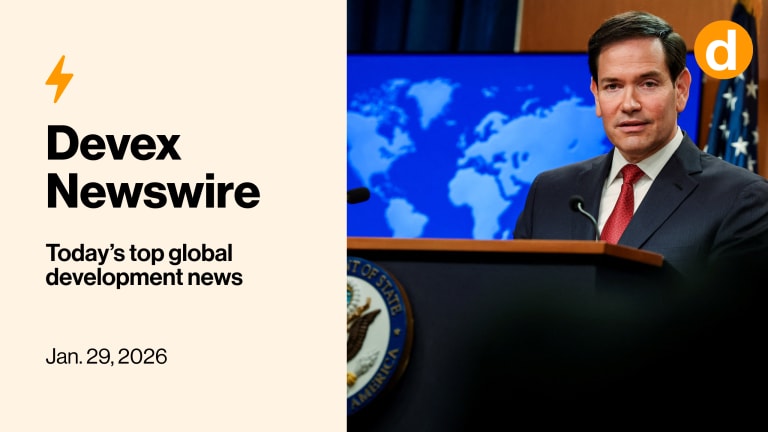
WASHINGTON — U.S. President Donald Trump has offered scant evidence of a philosophy to guide his view for how the United States should deploy foreign assistance resources in support of foreign policy.
“We don’t just hand out money, and we won’t just prop up the powerful. We insist upon the rule of law.”
— Mark Green, USAID administratorWhen Trump mentions foreign aid, it is usually in the form of a complaint — that the countries receiving U.S. assistance do little on America’s behalf in return for this generosity. Trump made that point in his State of the Union address in January, and reiterated it in his speech to the United Nations General Assembly in September.
Moving toward a more reciprocal system — with rewards for America’s friends and withholdings from its enemies — is rumored to comprise a key principle of the closely guarded foreign assistance review currently underway inside Trump’s administration.
Beyond that general impression, the president has said little about what he thinks America should strive to achieve with its development resources. The White House’s repeated attempts to slash foreign affairs spending suggest Trump has his doubts such resources can achieve much.
More on the future of US aid:
► How policy wonks, politicos, and a conservative Republican remade US aid
► In Trump's US aid review, can development principles prevail?
In the absence of a clear development vision from the president — and at a time when other Trump appointees are trying to put their own stamp on American “soft power” through channels such as the foreign assistance review — U.S. Agency for International Development Administrator Mark Green faces a difficult task: to advocate for his own mission, and on his own terms, but in a way that will appeal to a skeptical boss.
Now more than 15 months in office, Green has begun to articulate a vision for USAID that sounds less like a statement of his personal views, and more like a claim to represent the Trump administration’s global development doctrine.
Speaking at the U.S. Global Leadership Coalition’s tribute dinner on Wednesday — at which he was honored — Green harkened back to his experiences as a teacher in Kenya three decades ago, and to his students’ desire for educational opportunity.
“It forms the heart of what the Trump administration calls the ‘journey to self-reliance,’” Green said, referring to an internal principle closely associated with Green himself — and which the president has rarely, if ever, invoked.
In seeking to define development for the Trump era, Green has doubled down on the notion that USAID offers countries an alternative development model to what China is promising — which he called the “authoritarian approach.” He is also betting that pursuing development through a lens of great power competition will allow USAID to still prioritize good development principles and outcomes.
“One approach, the authoritarian approach, is really predatory lending dressed up as assistance. It lures borrowers with promises of easy money but then straddles them with unsustainable levels of debt,” Green said. “Our approach — the American approach — on the other hand, moves countries from being recipients, to partners, to fellow donors. It’s based upon the notion of a hand up, not a handout, and it helps position countries to grasp their own future.”
A key difference between China and the U.S., in Green’s formulation, is aid transparency.
“The authoritarian approach treats assistance as it does all else — a state secret. So they have ribbon cuttings that are very public for those building and roads, but all that glitters is not gold. Ask about the fine print, or meeting engineering codes, or impact on habitat, and they’ll simply turn the other way,” he said.
The USAID chief pointed out that of the 45 donors ranked by the International Aid Transparency index, the only Chinese institution evaluated — the ministry of commerce — “finishes dead last.” USAID currently ranks 16th, and the U.S.’s Millennium Challenge Corporation ranks 5th.
Green alleged that China, while claiming a doctrine of noninterference in countries’ internal affairs, equips dictators — such as Venezuelan President Nicolás Maduro — with “the surveillance technology inspired by Tiananmen Square.” Meanwhile, China’s state-controlled enterprises “prowl for innovations and technology to harvest,” while the authoritarian state “treats assistance as a tool to feed military ambitions.”
In contrast, Green said, the U.S. pursues a more difficult, more complicated approach to development partnerships.
“We don’t just hand out money, and we won’t just prop up the powerful. We insist upon the rule of law. We firmly oppose corruption, and we ask partners to put their own skin in the game,” Green said. “We frustrate some with our focus on human dignity, as well as our call for the freedoms of faith, speech, and association. We have an annoying habit of empowering women and marginalized communities.”
Green is hardly the only U.S. foreign policy leader to argue for American global engagement as a counterweight to Chinese investment. The recently passed BUILD Act, which will establish a new U.S. development finance institution, moved from dream to reality in large part because of concerns that America was ceding influence to China in developing countries.
Still, U.S. development professionals find themselves on familiar — and sometimes rocky — terrain. For their work to be effective, it must be country-led, with a long-term outlook, and a primary focus on development outcomes. But for many politicians — particularly those in the White House — to support their work, it has to advance America’s strategic and diplomatic priorities.
In Green’s evolving vision, we may get another test of whether it can do both.








